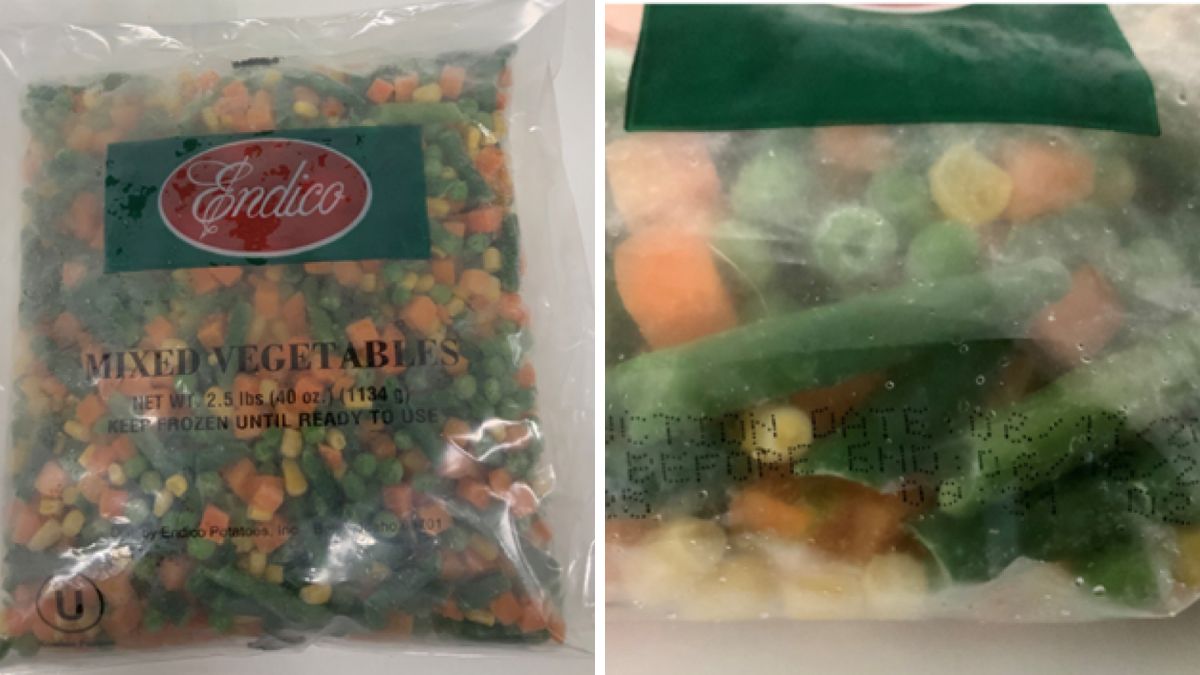
Do you regularly buy frozen vegetables? Then this information is for you, as the U.S. Food and Drug Administration (FDA) has announced the recall of several batches of a well-known brand due to possible contamination with a bacteria that can pose health risks to consumers. We’ll tell you which brand it is and what you should do if you have any of these products.
Which frozen vegetables were recalled?
The recall involves Endico Potatoes frozen vegetables. These are the affected products:
Peas and carrots
- Batch: 110625
- Production date: June 11, 2025
- Expiration date: June 10, 2027
ALSO READ Which At Home stores will close in September? List
Mixed vegetables
- Batch: 170625
- Production date: June 17, 2025
- Expiration date: June 16, 2027
Why were Endico Potatoes frozen vegetables recalled?
According to the FDA, tests conducted on the bags of frozen peas and carrots, as well as mixed vegetables, revealed the presence of Listeria monocytogenes, a bacteria that can cause serious and sometimes fatal infections in young children, frail or elderly people, and others with weakened immune systems.
Where were the listeria-contaminated frozen vegetables sold?
The contaminated product was sold in the following areas of the country between July 18 and August 4, 2025:
- Connecticut
- Florida
- New York
- New Jersey
- Pennsylvania
- Maryland
- Washington, D.C.
What should I do if I bought the recalled frozen vegetables?
So far, no illnesses have been reported due to these products. However, the FDA has advised anyone who still has them in their freezer not to consume them and to discard them immediately. Customers can return the product to the store where it was purchased for a full refund.
What is listeria?
Listeria monocytogenes is a bacterium responsible for an infection that can be very serious or even fatal. This condition particularly affects young children, the elderly, pregnant women, and those with weakened immune systems.
ALSO READ Perkins launches new back-to-school meal line: What’s included?
Symptoms of listeria
Listeria infection may include the following symptoms, typically appearing within a month:
- Fever
- Muscle aches
- Fatigue
- Headache
- Stiff neck
- Loss of balance
- Seizures
- Confusion
In pregnant women, it can lead to miscarriages or stillbirth.
How dangerous is listeria?
Listeria infection can affect various organs, including the brain, spinal cord membranes, and the circulatory system.
How is listeria transmitted?
The bacterium are widespread in the environment, present in both water and soil. Infected animals can also act as carriers and sources of transmission.
Listeria can be transmitted in the following ways:
- Consumption of unpasteurized milk or contaminated vegetables.
- Transmission from mother to fetus in the womb or directly to the fetus during childbirth.
- Through sexual contact.
- Through inhalation of the organism.
How to prevent listeria?
Since this microorganism is widespread in the environment, the most effective protection is to follow basic hygiene practices. This includes consuming only pasteurized dairy products, ensuring meats are well cooked, and properly washing hands before preparing food.
It is also recommended that pregnant women and individuals with weakened immune systems avoid consuming these foods, along with soft cheeses and raw deli meats.
What Foods Cause Listeria?
Some foods that can cause a listeria infection include:
- Dairy products made with unpasteurized milk
- Cold cuts and processed meats (such as sausages, hams, and pâtés)
- Smoked fish, such as salmon









